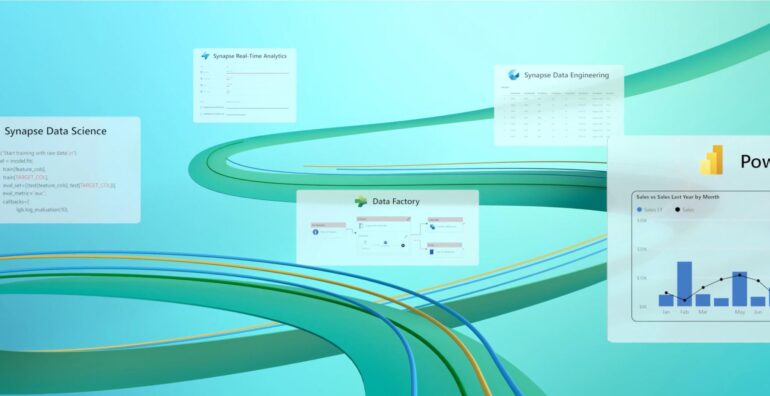TL;DR:
- Microsoft introduces data and AI solutions for healthcare at the HLTH 2023 conference.
- Healthcare data growth poses challenges, with most data remaining unused.
- Microsoft Fabric unifies healthcare data analytics and enables secure data access.
- Key features of Microsoft Fabric: data integration, multimodal foundation, analytics capabilities, and de-identification service.
- Real-world applications include Northwestern Medicine, Arthur Health, and SingHealth.
- Azure AI services offer healthcare-specific capabilities for informed decisions.
- Dragon Ambient eXperience (DAX) Copilot reduces clinician burnout with AI-powered clinical summaries.
- Microsoft Cloud for Healthcare provides industry-relevant data solutions and AI services.
- These innovations signify a transformative shift in healthcare, leveraging data and AI for improved patient care and operational efficiency.
Main AI News:
Introduction: In an era where data reigns supreme, Microsoft has unveiled a groundbreaking suite of data and AI solutions tailored explicitly for healthcare organizations. This announcement, made at the HLTH 2023 conference, marks a significant leap forward in the quest to improve patient and clinician experiences, drive better healthcare outcomes, and enhance organizational efficiency in the healthcare sector.
The Power of Data in Healthcare: The healthcare industry generates vast amounts of data, with hospitals alone producing 50 petabytes of data each year. Astonishingly, 97% of this data remains unused, representing a treasure trove of untapped potential. Microsoft recognizes that harnessing this data is the key to unlocking transformative clinical and operational breakthroughs. In this new age of artificial intelligence (AI), an effective data strategy is essential for healthcare organizations to realize the full potential of AI technologies.
Microsoft Fabric: Unifying Data Analytics: At the heart of Microsoft’s healthcare data revolution is Microsoft Fabric, a unified analytics platform designed to bring together all the data and analytics tools necessary for unlocking data’s true potential. These industry-specific healthcare data solutions eliminate the complexities associated with integrating disparate data sources and provide a secure and governed environment for data analysis.
Key Features of Microsoft Fabric:
- Integration of data from various sources such as electronic health records, medical imaging systems, lab systems, and medical devices.
- Multimodal data foundation enabling standardized, scalable solutions for clinical and operational insights.
- Capabilities like Observational Medical Outcomes Partnership (OMOP) analytics and patient outreach analytics.
- De-identification service for protecting patient-protected health information (PHI) while extracting insights from unstructured data.
- Governance and data management tools through Microsoft Purview.
Real-World Applications: Leading healthcare organizations are already planning to leverage Microsoft Fabric to advance their most critical use cases:
- Northwestern Medicine: Integrating clinical data to improve patient care and meet regulatory mandates.
- Arthur Health: Powering predictive care models in partnership with Quisitive for the Ontario Workers Network (OWN).
- SingHealth: Transforming healthcare delivery and services in Singapore.
AI Capabilities for Improved Patient Outcomes: Microsoft’s Azure AI services are introducing new healthcare capabilities aimed at maximizing the value of AI for positive patient outcomes. These include:
- Azure AI Health Insights: Prebuilt models to aid clinicians and researchers in making informed decisions.
- Generative AI for healthcare chatbots and virtual assistants.
- Text Analytics for health, which extracts and labels essential medical information from unstructured texts.
Empowering Clinicians with AI: Clinician burnout has been on the rise, making it crucial to empower healthcare professionals. Microsoft is addressing this issue with Dragon Ambient eXperience (DAX) Copilot, an AI-powered solution that automates clinical summaries and reduces documentation time, allowing clinicians to focus on patient care.
Microsoft Cloud for Healthcare: All these innovations are bolstered by Microsoft Cloud for Healthcare, offering industry-specific data solutions, application templates, and AI services. These solutions are built on a foundation of trust and responsible AI principles, providing healthcare organizations with the tools to create connected experiences, foster collaboration, empower their workforce and unlock the value of clinical and operational data.
Conclusion:
Microsoft’s healthcare data and AI solutions mark a pivotal development in the healthcare market. The ability to harness vast amounts of data and apply AI technologies promises to enhance patient experiences, drive better healthcare outcomes, and streamline operations for healthcare organizations. This demonstrates a significant opportunity for healthcare providers to leverage data-driven insights and AI capabilities to deliver more efficient and effective care while prioritizing patient and clinician well-being.

